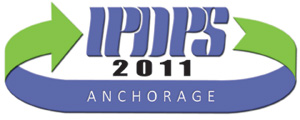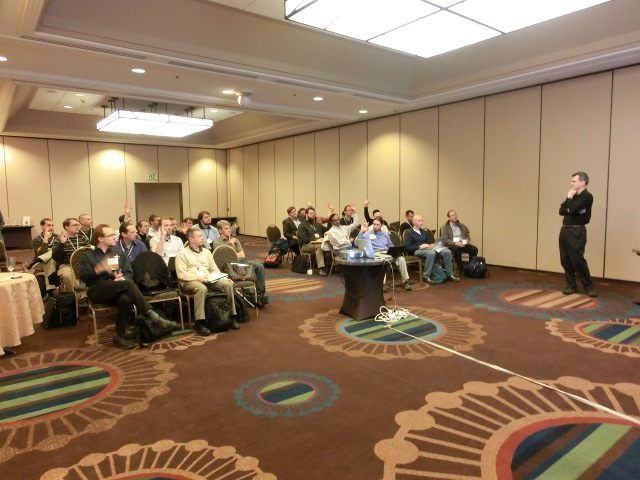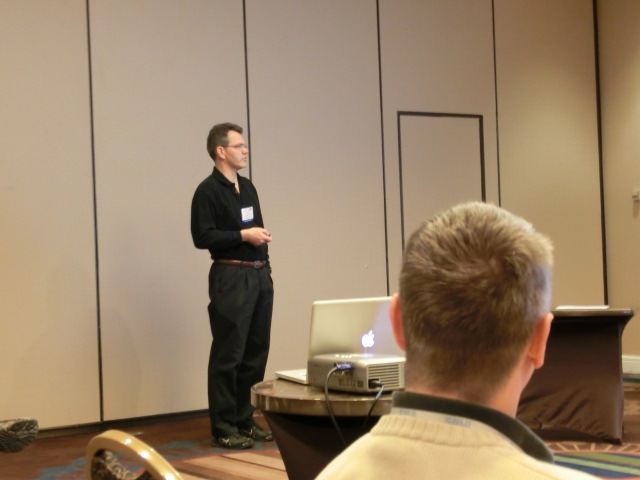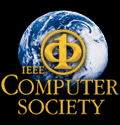








The 16th HIPS workshop, to be held as a full-day meeting at the IPDPS 2011 conference in Anchorage, focuses on high-level programming of multiprocessors, compute clusters, and massively parallel machines. Like previous workshops in the series, which was established in 1996, this event serves as a forum for research in the areas of parallel applications, language design, compilers, runtime systems, and programming tools. It provides a timely and lightweight forum for scientists and engineers to present the latest ideas and findings in these rapidly changing fields.

This year we especially encourage innovative approaches in the areas of emerging programming models for large-scale parallel systems and many-core architectures. The topics include but are not limited to:

| Time | Howard Rock A | Howard Rock B |
| 8:45-9:00 | Torsten Hoefler: Workshop Opening and Overview | |
| 9:00-10:00 | Keynote: John Mellor-Crummey: Coarray Fortran 2.0: A productive language for scalable scientific computing | |
| 10:00-10:30 | Coffee Break | |
| 10:30-12:00 |
(Chair: Pavan Balaji) Using Shared Arrays in Message-Driven Parallel Programs George Bosilca and Aurelien Bouteiller and Anthony Danalis and Thomas Herault and Jack Dongarra and Pierre Lemarinier: DAGuE: A generic distributed DAG engine for high performance computing Clemens Grelck: The Essence of Synchronisation in Asynchronous Data Flow |
(Chair: Felix Wolf) Auto-Generation of Parallel Finite-Differencing Code for MPI, TBB and CUDA Michel Steuwer and Philipp Kegel and Sergey Gorlatch: SkelCL - A Portable Skeleton Library for High-Level GPU Programming Jing Guo and Antonio Wendell O Rodrigues and Jeyarajan Thiyagalingam and Frederic Guyomarc'h and Pierre Boulet and Sven-Bodo Scholz: Harnessing the Power of GPUs without Losing Abstractions in SAC and ArrayOL: A Comparative Study |
| 12:00-13:00 | Lunch Break | |
| 13:00-15:00 |
(Chair: Torsten Hoefler) Address translation optimization for Unified Parallel C multi-dimensional arrays Jesper Larsson Traff: A (radical) proposal addressing the non-scalability of the irregular MPI collective interfaces Joshua J Hursey and Richard Graham: Preserving Collective Performance Across Process Failure for a Fault Tolerant MPI Lingyuan Wang and Saumil Merchant and Tarek El-Ghazawi: Exploiting Hierarchical Parallelism Using UPC |
(Chair: Patricia Kovatch) Parallel Object Contracts for High Performance Computing Pieter Hijma and Rob V van Nieuwpoort and Ceriel Jacobs and Henri Bal: Automatically Inserting Synchronization Statements in Divide-and-Conquer Programs Bin Ren and Gagan Agrawal: Translating Chapel to Use FREERIDE: A Case Study in Using a HPC Language for Data-Intensive Computing Shigeru Kusakabe: Large Volume Testing for Executable Formal Specification using Hadoop |
| 15:00-15:30 | Coffee Break | |
| 15:30-17:00 |
(Chair: Jesper Larsson Träff) Towards a Methodology for Deliberate Sample-Based Statistical Performance Analysis Vilas Jagannath and Zuoning Yin and Mihai Budiu: Monitoring and Debugging DryadLINQ Applications with Daphne Nick Rutar and Jeffrey K Hollingsworth: Data Centric Techniques for Mapping Performance Measurements |
(Chair: Craig Rasmussen) Toolchain for Programming, Simulating and Studying the XMT Many-Core Architecture Martin Sandrieser and Siegfried Benkner and Sabri Pllana: Explicit Platform Descriptions for Heterogeneous Many-Core Architectures Ettore Speziale and Andrea Di Biagio and Giovanni Agosta: An Optimized Reduction Design to Minimize Atomic Operations in Shared Memory Multiprocessors |

| Submission deadline: | December 20, 2010 (extended) |
| Author notification: | February 7, 2011 |
| Camera-ready final papers due: | February 18, 2011 |
The HIPS workshop proceedings will be published electronically along with the IPDPS conference proceedings via IEEE Xplore. Submitted manuscripts should be formatted according to IPDPS proceedings guidelines: 10-point fonts, single-spaced, and two-column format. The page size is US letter (8.5x11 inch). The maximal length is 8 pages. All papers must be in English. A call for papers in pdf format can be found here.
The workshop uses the EDAS conference manager for submission and notification. An author needs to register with EDAS as a user if this has not been done previously. Start the paper by providing the title and the abstract in plain text, and then submit the full paper in PDF. Please click here to start the process and follow the instructions. If you experience any problem, please contact us immediately.
The best papers in the area of parallel computing will be considered for inclusion in a special issue of Elsevier Parallel Computing (PARCO).

| Workshop Chair | |
| Torsten Hoefler | Blue Waters Directorate, NCSA, University of Illinois at Urbana-Champaign, USA |
| Steering Committee | |
| Rudolf Eigenmann | Purdue University, USA |
| Michael Gerndt | Technische Universität München, Germany |
| Frank Müller | North Carolina State University, USA |
| Craig Rasmussen | Los Alamos National Laboratory, USA |
| Martin Schulz | Lawrence Livermore National Laboratory, USA |
| Program Committee (alphabetically) | |
| Sadaf Alam | Swiss National Supercomputing Centre, Switzerland |
| Pavan Balaji | Argonne National Laboratory, USA |
| Richard Barrett | Sandia National Laboratories, USA |
| Brett Bode | National Center for Supercomputing Applications, USA |
| George Bosilca | University of Tennessee Knoxville, USA |
| Greg Bronevetsky | Lawrence Livermore National Laboratory, USA |
| Anthony Danalis | University of Tennessee Knoxville, USA |
| Bronis de Supinski | Lawrence Livermore National Laboratory, USA |
| Chen Ding | University of Rochester, USA |
| Michael Gerndt | Technische Universität München, Germany |
| Thomas Fahringer | University of Innsbruck, Austria |
| Yutaka Ishikawa | University of Tokyo, Japan |
| Andreas Knüpfer | Technische Universität Dresden, Germany |
| Bernd Mohr | Forschungszentrum Jülich, Germany |
| Craig Rasmussen | Los Alamos National Laboratory, USA |
| Sven-Bodo Scholz | University of Herfordshire, UK |
| Martin Schulz | Lawrence Livermore National Laboratory, USA |
| Tony Skjellum | University of Alabama Birmingham, USA |
| Marc Snir | University of Illinois at Urbana-Champaign, USA |
| Fabian Tillier | Microsoft, USA |
| Jesper Larsson Träff | University of Vienna, Austria |
| Jeremiah Willcock | Indiana University, USA |
| Felix Wolf | German Research School for Simulation Sciences, Germany |

For further questions, please contact Torsten Hoefler.





|
IEEE Computer Society |

| 15th HIPS 2010 | April 19th 2010, Atlanta, Georgia, USA. |
| 14th HIPS 2009 | May 25th 2009, Rome, Italy. |
| 13th HIPS 2008 | April 14th 2008, Miami, Florida, USA. |
| 12th HIPS 2007 | March 26th 2007, Long Beach, California, USA. |
| 11th HIPS 2006 | April 25th 2006, Rhodes Island, Greece. |
| 10th HIPS 2005 | April 4th 2005, Denver, Colorado, USA. |
| 9th HIPS 2004 | April 26th 2004, Santa Fe, New Mexico, USA. |
| 8th HIPS 2003 | April 22th 2003, Nice, France. |
| 7th HIPS 2002 | April 15th 2002, Fort Lauderdale, FL, USA. |
| 6th HIPS 2001 | April 23rd 2001, San Francisco, CA, USA. |
| 5th HIPS 2000 | May 1st 2000, Cancun, Mexico. |
| 4th HIPS 1999 | April 12th 1999, San Juan, Puero Rico, USA. |
| 3rd HIPS 1998 | March 30th 1998, Orlando, FL, USA. |
| 2nd HIPS 1997 | April 1st, 1997, Geneva, Switzerland. |
| 1st HIPS 1996 | April 16th, 1996, Honolulu, HI, USA. |

Webdesign: Nataliya Berezneva